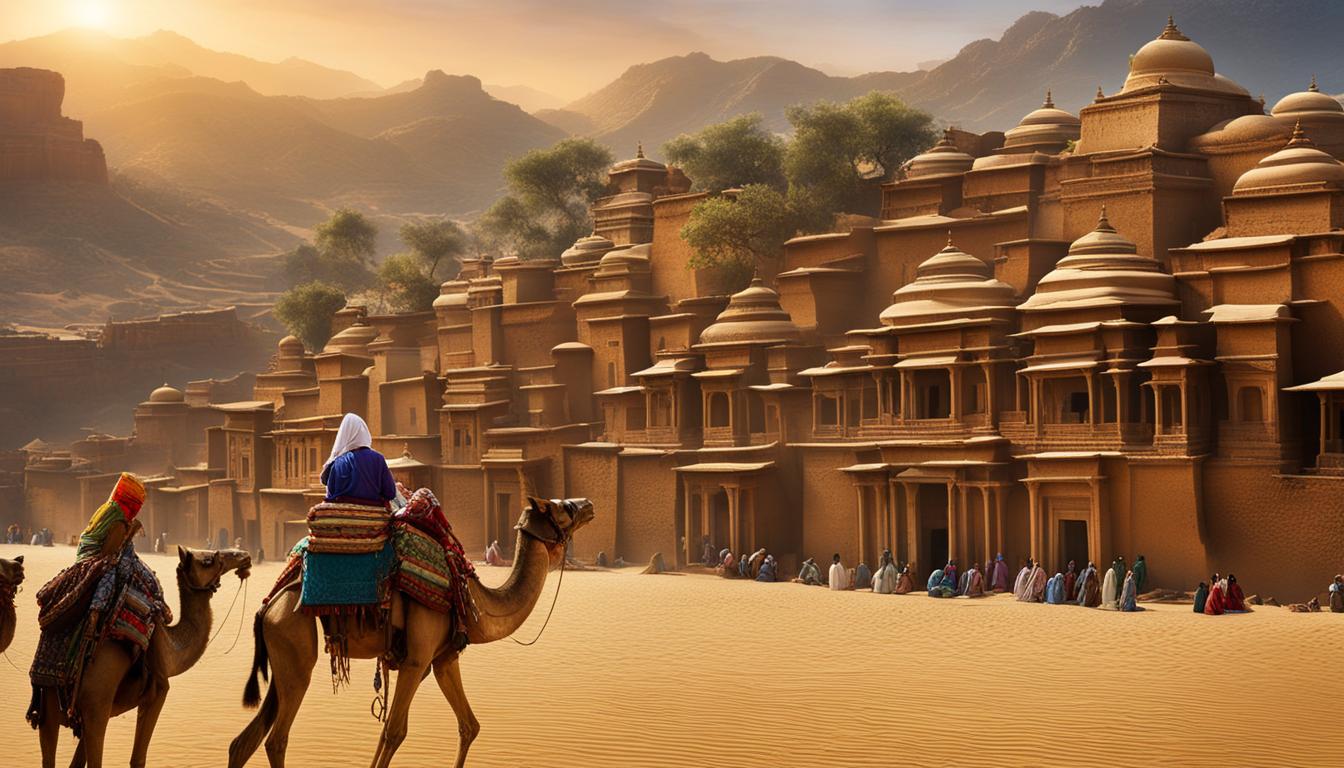Ammon is an ancient city of great biblical importance. It was a bustling city in biblical times, with distinct districts and neighborhoods. Notable biblical figures, such as King David and the prophet Jeremiah, have strong connections to Ammon. The city witnessed significant biblical events, including battles and sieges that shaped its history. Today, Ammon remains a city of intrigue, offering a blend of ancient history and modern attractions.
Key Takeaways:
- Ammon is an ancient city of biblical importance.
- Notable biblical figures linked to Ammon include King David and the prophet Jeremiah.
- Ammon had distinct districts and neighborhoods in biblical times.
- The city witnessed significant biblical events that shaped its history.
- Today, Ammon offers a unique blend of ancient history and modern attractions.
Exploring the Districts of Ammon
Ammon, the ancient city with great biblical importance, is divided into several districts and neighborhoods, each offering a unique experience. Let’s take a closer look at these districts to discover what they have to offer.
Rainbow Street (Jabal Amman)
Rainbow Street, also known as Jabal Amman, is a popular and modern area in Ammon. It is famous for its cobbled streets, vibrant cafes, and art galleries. The district showcases a blend of traditional and contemporary Jordanian culture, making it a hub for locals and tourists alike.
El-Weibdeh
El-Weibdeh is a historic district in Ammon that has undergone rejuvenation in recent years. It is now home to trendy restaurants and live music venues, attracting a younger crowd. The district’s bohemian vibe and artistic atmosphere make it a must-visit for those seeking a unique cultural experience.
Abdoun
Abdoun is a wealthy neighborhood in Ammon known for its upscale homes, stylish bars, and fine dining restaurants. The district offers a luxurious experience with its high-end boutiques and exclusive atmosphere. Visitors can indulge in world-class cuisine and experience the city’s vibrant nightlife in Abdoun.
Al Hussein Public Park
The Al Hussein Public Park is a peaceful retreat in Ammon, providing a serene environment away from the bustling city streets. The park offers leisure facilities, including walking trails, picnic areas, and playgrounds. It is also home to various museums, showcasing the rich cultural heritage of Ammon.
Shmeisani
Shmeisani is the most modern district in Ammon, offering a range of amenities such as shopping malls, restaurants, and hotels. The district is known for its contemporary architecture and bustling commercial centers. Visitors can enjoy a mix of international cuisine, shopping opportunities, and entertainment options in Shmeisani.
Downtown Amman (Al-Balad)
Downtown Amman, also known as Al-Balad, is the historic center of Ammon. It is home to iconic landmarks such as the Amman Citadel and the Roman Theater. The district is characterized by its bustling souqs, where visitors can explore traditional markets and indulge in local cuisine. Downtown Amman offers a glimpse into the city’s rich history and vibrant culture.
Exploring Ammon’s Biblical Significance
Ammon, the ancient city, holds great biblical importance due to its association with notable figures such as King David and the prophet Jeremiah. King David’s relationship with Bathsheba, the wife of Uriah the Hittite, took place in Ammon. The prophet Jeremiah made prophecies regarding the destruction of Ammon. These biblical events not only shaped the history of the city but also left a lasting impact on its development.
“And it came to pass in an eveningtide, that David arose from off his bed, and walked upon the roof of the king’s house: and from the roof he saw a woman washing herself; and the woman was very beautiful to look upon.” – 2 Samuel 11:2
In biblical times, Ammon was a bustling city with distinct districts and neighborhoods. It played a significant role in various biblical events, including battles and sieges against neighboring nations. Ammon’s involvement in these conflicts shaped the political landscape of the region and influenced the city’s development.
Today, the biblical significance of Ammon can still be explored through archaeological sites and artifacts found in the region. These remnants of the past offer a glimpse into the rich history and cultural heritage of Ammon, providing a deeper understanding of its biblical importance.
The Prophet Jeremiah
The prophet Jeremiah played a crucial role in the history of Ammon. He not only prophesied regarding the destruction of the city but also confronted the king and people of Ammon with the word of God. Jeremiah’s prophecies served as warnings of the consequences of their actions and choices.
| Jeremiah’s Prophecies | Biblical References |
|---|---|
| The destruction of the city of Rabbah | Jeremiah 49:2 |
| The punishment of the Ammonites for mocking Jerusalem | Jeremiah 49:3 |
| The restoration and blessing of Ammon | Jeremiah 49:6 |
Jeremiah’s prophecies and his encounters with the people of Ammon provide valuable insights into the religious, social, and political dynamics of the city during biblical times. Exploring the biblical significance of Ammon allows us to delve deeper into the ancient world and gain a better understanding of its relevance in history.
Ammon, with its biblical significance and rich history, continues to captivate and intrigue visitors today. It stands as a testament to the ancient civilizations that once thrived in the region and offers a unique opportunity to explore the stories and events that shaped the world we know today.
Unveiling the Ancient Ammonite Culture
The ancient city of Ammon was not only of great biblical importance but also had a rich and vibrant culture that shaped its society. The Ammonites had their own unique traditions, customs, and ways of life that set them apart from other ancient civilizations. Let’s delve into the fascinating world of the ancient Ammonite culture.
The Ammonite Language and Worship
The Ammonites had their own language, which was closely related to Hebrew and Amorite. They also had their own pantheon of gods, with Milcom and Molech being the most prominent deities. The Ammonites practiced various religious rituals and sacrifices to appease their gods and ensure prosperity.
Arts, Crafts, and Agriculture
The ancient Ammonite culture was known for its artistic skills in pottery and metalworking. They produced intricate pottery vessels adorned with geometric patterns and motifs. Additionally, the Ammonites were skilled in metalworking, creating jewelry, weapons, and decorative objects.
Agriculture played a crucial role in the Ammonite society, with the cultivation of vineyards and olive groves being particularly important. These agricultural practices sustained their economy and provided essential resources.
Social Hierarchy and Daily Life
The Ammonite society had a hierarchical structure, with kings and nobles ruling over the people. The king held significant power and was responsible for making important decisions regarding the welfare of the kingdom. The common people engaged in various trades and occupations, supporting the economy and contributing to the overall prosperity of Ammon.
On a daily basis, the Ammonites led lives centered around their agricultural activities, crafts, and religious practices. They valued family and community, and hospitality was an important aspect of their culture.
| Aspect | Description |
|---|---|
| Language | The Ammonites had their own language, closely related to Hebrew and Amorite. |
| Religion | The Ammonites worshiped their own gods, with Milcom and Molech being prominent deities. |
| Arts and Crafts | The Ammonites excelled in pottery and metalworking, producing intricately designed vessels and decorative objects. |
| Agriculture | Agriculture, particularly the cultivation of vineyards and olive groves, was vital to the Ammonite economy. |
| Social Hierarchy | The Ammonite society had a hierarchical structure, with kings and nobles ruling over the people. |
| Daily Life | The Ammonites led lives centered around agriculture, crafts, and religious practices, valuing family and hospitality. |
Uncovering the Ammonite Culture: Archaeological Discoveries
Archaeological excavations have provided valuable insights into the ancient Ammonite culture. Artifacts such as pottery, metal objects, and inscriptions have been unearthed, shedding light on their artistic skills, religious practices, and daily life. These discoveries continue to deepen our understanding of the Ammonites and their contributions to ancient history.
The ancient Ammonite culture is a fascinating chapter in history, offering a glimpse into a society that thrived thousands of years ago. Through their language, worship, arts, and daily life, the Ammonites left behind a rich legacy that continues to captivate scholars and enthusiasts alike.
Ammon’s Role in Biblical Events
Ammon, an ancient city of significant biblical importance, played a crucial role in various biblical events, especially battles and sieges. These events not only shaped the city’s history but also influenced its development and political landscape.
The conflicts and battles between Ammon and neighboring nations, such as Israel and Judah, were a recurring theme in biblical history. One notable event was the War of Ammon against Israel and Judah, in which the Ammonites faced military opposition from these powerful kingdoms.
Ammon also experienced the destruction caused by invasions and sieges. One such instance was when the Babylonians destroyed Ammon, leading to the city’s downfall and subsequent restoration. These events highlight the tumultuous nature of Ammon’s history and its resilience in the face of adversity.
The Impact of Biblical Events on Ammon
The biblical events that unfolded in Ammon had a profound impact on its history and development. The city’s strategic location made it a significant target for conquest, resulting in numerous battles and sieges. These conflicts shaped the political landscape of the region and influenced the city’s geopolitical position.
“War of Ammon against Israel and Judah, in which the Ammonites faced military opposition from these powerful kingdoms.”
The destruction of Ammon by the Babylonians marked a turning point in the city’s history. It led to a period of decline and subsequent restoration, as well as cultural and political shifts within the region. The city’s ability to endure and rebuild after such devastation is a testament to its resilience and importance in biblical times.
Today, Ammon stands as a remarkable archaeological site, providing valuable insights into its ancient past and the biblical events that transpired within its walls. Exploring Ammon allows visitors to witness the remnants of a bygone era and appreciate the rich historical significance of this ancient city.

| Biblical Events | Impact on Ammon |
|---|---|
| War of Ammon against Israel and Judah | Ammon faced military opposition and experienced the consequences of conflict. |
| Destruction of Ammon by the Babylonians | Ammon was devastated but later restored, leading to cultural and political shifts. |
Ammon’s Present-Day Attractions
Ammon, with its rich ancient history, offers a multitude of present-day attractions that captivate visitors from around the world. From archaeological sites to museums, there is something for everyone to explore and appreciate in this remarkable city.
One of the must-visit attractions in Ammon is the Amman Citadel. This ancient archaeological site, perched on a hilltop, offers stunning panoramic views of the city. Visitors can immerse themselves in the fascinating history of Ammon as they explore the ruins of Roman temples, the Umayyad Palace, and the Byzantine church. The Citadel Archaeological Museum also houses a collection of artifacts that shed light on the city’s past.
| Attraction | Description |
|---|---|
| Roman Theater | The Roman Theater is a well-preserved amphitheater that dates back to the 2nd century AD. It is known for its impressive acoustics and hosts various cultural events and performances. |
| Jordan Archaeological Museum | The Jordan Archaeological Museum boasts a diverse collection of artifacts from Ammon and other archaeological sites in Jordan. It offers a glimpse into the rich cultural heritage of the region. |
| Royal Automobile Museum | This unique museum showcases a collection of vintage cars and motorcycles that belonged to the Jordanian royal family. Car enthusiasts and history buffs alike will be delighted by the display of automotive history. |
For those looking to experience the vibrant cultural scene, Rainbow Street is a must-visit. This bustling street is lined with trendy cafés, art galleries, and boutique shops. It is the perfect place to soak up the lively atmosphere and indulge in local cuisine.
Ammon’s museums are also worth exploring to delve deeper into the city’s history. The Jordan Archaeological Museum, as mentioned earlier, provides an extensive collection of artifacts, while other museums like the Jordan Museum and the Museum of Jordanian Heritage offer insights into the country’s broader history and culture.
With its blend of ancient history and modern attractions, Ammon offers a truly unique and captivating experience for every visitor.
Exploring the Surrounding Areas of Ammon
While exploring the ancient city of Ammon is undoubtedly a captivating experience, there are also numerous opportunities to venture out and explore the surrounding areas. Day trips and tours are available to popular destinations such as Petra, the Dead Sea, and Jerash, allowing visitors to delve deeper into Jordan’s rich history and natural wonders.
One of the must-visit destinations near Ammon is Petra, a UNESCO World Heritage Site and one of the New Seven Wonders of the World. Famous for its intricate rock-cut architecture, including the iconic Treasury, Petra offers a mesmerizing journey through ancient Nabatean history.
Another popular excursion option is the Dead Sea, located just a short drive from Ammon. The Dead Sea is known for its high salt content, allowing visitors to float effortlessly on its buoyant waters. Besides the unique swimming experience, the Dead Sea is also renowned for its therapeutic properties.
Quote: “The surrounding areas of Ammon offer diverse landscapes and historical treasures, providing a well-rounded experience for travelers.” – Jordan Travel Magazine
For those interested in Roman history, a trip to Jerash is a must. Known for its well-preserved Roman ruins, including an impressive amphitheater and colonnaded streets, Jerash offers a glimpse into the ancient past. The city also hosts an annual Jerash Festival, featuring music, dance, and theatrical performances.
Exploring the surrounding areas of Ammon allows visitors to witness the diversity and beauty of Jordan. Whether immersing oneself in ancient Nabatean history in Petra, indulging in the therapeutic waters of the Dead Sea, or marveling at the Roman ruins in Jerash, the surrounding areas offer unforgettable experiences that complement the rich history of Ammon.
Table: Day Trips and Tours from Ammon
| Destination | Description |
|---|---|
| Petra | Ancient Nabatean city with intricate rock-cut architecture, including the iconic Treasury. |
| Dead Sea | Highly saline lake known for its buoyant waters and therapeutic properties. |
| Jerash | Well-preserved Roman ruins, including an amphitheater and colonnaded streets. |
Tips for Traveling to Ammon
When planning your trip to Ammon, there are a few important travel tips to keep in mind. Ensuring a smooth and enjoyable experience in this ancient city is crucial, so here are some tips to help you make the most of your visit.
Transportation:
Ammon can be a bustling city with heavy traffic, so it is recommended to hire a driver or go with an organized tour to navigate the city efficiently. Uber is available in Ammon, providing a convenient and reliable transportation option. Additionally, private taxis are readily available and offer a flexible mode of transportation within the city.
Safety:
Jordan is known for its political stability, but it is always important to stay informed about safety and security measures. While Ammon itself is considered safe for travelers, it is advisable to be cautious and aware of your surroundings, especially in crowded areas or at night. The local population is known for their hospitality, and visitors have reported feeling safe during their stay in Ammon.
Respect Local Customs:
Jordan is a culturally rich country, and it is important to respect local customs and traditions. Dress modestly when visiting religious sites or conservative areas, and be mindful of the local culture. It is always best to ask for permission before taking photos of people, particularly women, and be respectful of their privacy.
Summary:
When traveling to Ammon, it is advisable to hire a driver or go with an organized tour to navigate the city’s heavy traffic. Use Uber or private taxis for convenient transportation within the city. While Ammon is considered safe, it is recommended to stay informed about safety and security measures. Respect local customs and traditions, and dress modestly when visiting religious sites or conservative areas. By following these travel tips, you can ensure a pleasant and memorable experience in Ammon.
Where to Stay in Ammon
When visiting the ancient city of Ammon, finding the perfect accommodation is essential for a comfortable and enjoyable stay. Ammon offers a range of options to suit every traveler’s needs, from budget-friendly guesthouses to luxurious hotels in upscale neighborhoods.
Popular Neighborhoods
Ammon’s neighborhoods each have their own unique charm and appeal. Rainbow Street, also known as Jabal Amman, is a vibrant and cultural area filled with trendy cafes, boutique hotels, and art galleries. It is an ideal choice for those who want to be close to the city’s artistic and bohemian scene.
If you prefer a more upscale experience, consider staying in the Abdoun neighborhood. Known for its luxurious homes, upscale restaurants, and vibrant nightlife, Abdoun offers a sophisticated and exclusive atmosphere.
Accommodation Options
Ammon offers a variety of accommodation options to suit different budgets and preferences. From budget-friendly guesthouses and backpacker hostels to high-end hotels and resorts, there is something for everyone. Here are a few popular choices:
| Accommodation | Neighborhood | Price Range |
|---|---|---|
| Rainbow Hotel | Rainbow Street | $$ |
| Abdoun Palace Hotel | Abdoun | $$$ |
| Backpackers Hostel | Downtown Amman | $ |
These are just a few examples, and there are many more options available throughout Ammon. It is advisable to book in advance, especially during peak travel seasons, to secure your preferred accommodation.

“The choice of accommodation in Ammon is vast, catering to all budgets and preferences. From trendy boutique hotels to luxurious resorts, there is something for every traveler. The neighborhoods of Ammon also offer distinct experiences, so choose one that aligns with your interests and desired atmosphere.” – Traveler’s Guide to Ammon
Indulge in Ammon’s Culinary Delights
Ammon offers a diverse range of culinary delights that will tantalize your taste buds. The local Jordanian cuisine is a highlight, with traditional dishes that showcase the rich flavors of the region. From the popular falafel and hummus to the mouthwatering mansaf, there are plenty of options to explore and savor.
When in Ammon, a visit to Rainbow Street is a must for food enthusiasts. This vibrant street is known for its eclectic mix of international and local restaurants, offering a wide range of cuisines to suit every palate. From cozy cafes to upscale eateries, Rainbow Street has something for everyone.
If you’re looking for a more traditional culinary experience, head to downtown Amman. Here, you’ll find street food vendors and authentic Jordanian eateries where you can taste local specialties and indulge in the flavors of Ammon’s rich heritage. Don’t miss the opportunity to try Jordan’s national dish, mansaf, a delicious combination of lamb, rice, and fermented yogurt sauce.

For those seeking a fine dining experience, Abdoun is the neighborhood to visit. Known for its upscale atmosphere and international cuisine, Abdoun boasts a range of restaurants offering exquisite dishes prepared by talented chefs. Whether you’re in the mood for Mediterranean, Asian, or European cuisine, Abdoun has the perfect spot to satisfy your cravings.
To fully immerse yourself in Ammon’s culinary scene, consider joining a food tour. These guided experiences take you on a culinary journey through the city, introducing you to hidden gems and local favorites. You’ll not only get to taste a variety of dishes but also learn about the history and culture behind each culinary creation.
Sample Local Dishes in Ammon:
- Falafel: Deep-fried balls made from ground chickpeas or fava beans, served in pita bread with tahini sauce and vegetables.
- Hummus: Creamy dip made from mashed chickpeas, sesame paste, olive oil, lemon juice, and garlic, typically served with bread or vegetables.
- Fattet Hummus: Layers of pita bread, chickpeas, yogurt, and spices, topped with toasted pine nuts and drizzled with olive oil.
- Mansaf: Jordan’s national dish, consisting of tender lamb cooked in fermented yogurt sauce, served over rice and garnished with almonds and parsley.
Ammon’s culinary scene is a gastronomic delight that will leave you craving for more. Whether you’re a food lover, an adventurous eater, or simply looking to indulge in the flavors of Jordan, Ammon has something special to offer.
Conclusion
Ammon is a city of immense historical significance, with a rich biblical heritage. This ancient city played a pivotal role in biblical events and was associated with notable biblical figures such as King David and the prophet Jeremiah. Its history and biblical importance make it a captivating destination for those eager to explore the roots of their faith.
In biblical times, Ammon was a thriving city with distinct districts and neighborhoods. It bustled with activity, and its architectural marvels showcased the ingenuity of its inhabitants. The city’s layout and infrastructure reflected its prosperity, contributing to its vibrant and dynamic atmosphere.
Throughout history, Ammon witnessed numerous pivotal events that shaped its destiny. Battles and sieges left indelible marks on the city, while the destruction and restoration cycles influenced its development. These historical events created a tapestry of resilience and growth that still resonates in the archaeological sites and artifacts that can be found in Ammon today.
Today, Ammon stands as a testament to the enduring legacy of its ancient past. Visitors can immerse themselves in its rich culture and explore the archaeological wonders that have stood the test of time. From the vibrant districts and neighborhoods to the modern amenities and attractions, Ammon offers a unique blend of ancient history and contemporary allure.
FAQ
What is the biblical significance of Ammon?
Ammon holds great biblical importance due to its association with notable figures such as King David and the prophet Jeremiah. King David’s relationship with Bathsheba took place in Ammon, and Jeremiah made prophecies regarding the destruction of Ammon.
How can I explore the different districts of Ammon?
Ammon is divided into several districts and neighborhoods, each offering a unique experience. Rainbow Street, El-Weibdeh, Abdoun, Al Hussein Public Park, Shmeisani, and Downtown Amman are some of the districts you can explore.
What can I learn about the ancient Ammonite culture?
The ancient Ammonite culture was rich and vibrant, with unique traditions and customs. They had their own language, worshiped their own gods, and were known for their skills in arts and crafts. They also excelled in agriculture, particularly in vineyards and olive groves.
What role did Ammon play in biblical events?
Ammon played a significant role in various biblical events, including battles and sieges with neighboring nations such as Israel and Judah. They faced destruction by the Babylonians and subsequent restoration. These events shaped the political landscape of the region.
What are some of the present-day attractions in Ammon?
Ammon offers a wide range of attractions for visitors, including archaeological sites like the Amman Citadel and Roman Theater, the Jordan Archaeological Museum, the Royal Automobile Museum, Rainbow Street, and downtown Amman with its souqs.
What are the surrounding areas of Ammon worth exploring?
There are several day trips and tours available to popular destinations such as Petra, the Dead Sea, and Jerash. These excursions allow visitors to delve deeper into Jordan’s rich history and natural wonders.
What travel tips should I keep in mind when visiting Ammon?
It is recommended to hire a driver or go with an organized tour due to heavy traffic in the city. Uber and private taxis are reliable transportation options within the city. Stay informed about safety and security measures in Jordan and respect local customs and traditions.
Where can I find accommodation in Ammon?
Ammon offers a range of accommodation options. Rainbow Street, El-Weibdeh, Abdoun, Shmeisani, and downtown Amman have various hotels and guesthouses to choose from, catering to different budgets and preferences.
What culinary delights can I indulge in while in Ammon?
Ammon is a culinary haven, offering a diverse range of dining options. Local Jordanian cuisine, such as falafel, hummus, and mansaf, is a must-try. Rainbow Street, downtown Amman, and Abdoun are known for their vibrant food scenes.
What makes Ammon an intriguing ancient city?
Ammon’s biblical importance, rich history, and blend of ancient and modern attractions make it a fascinating destination for history enthusiasts and travelers seeking a unique cultural experience.







